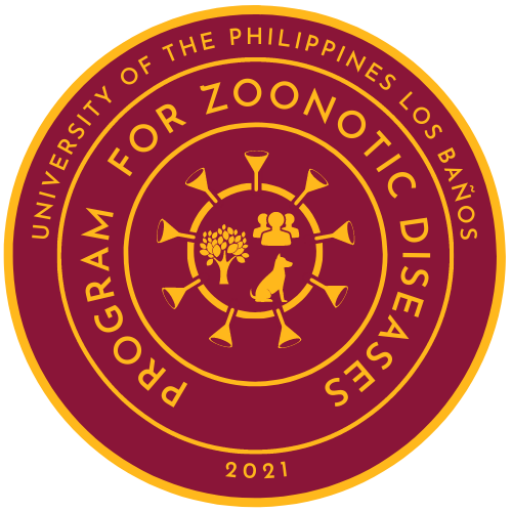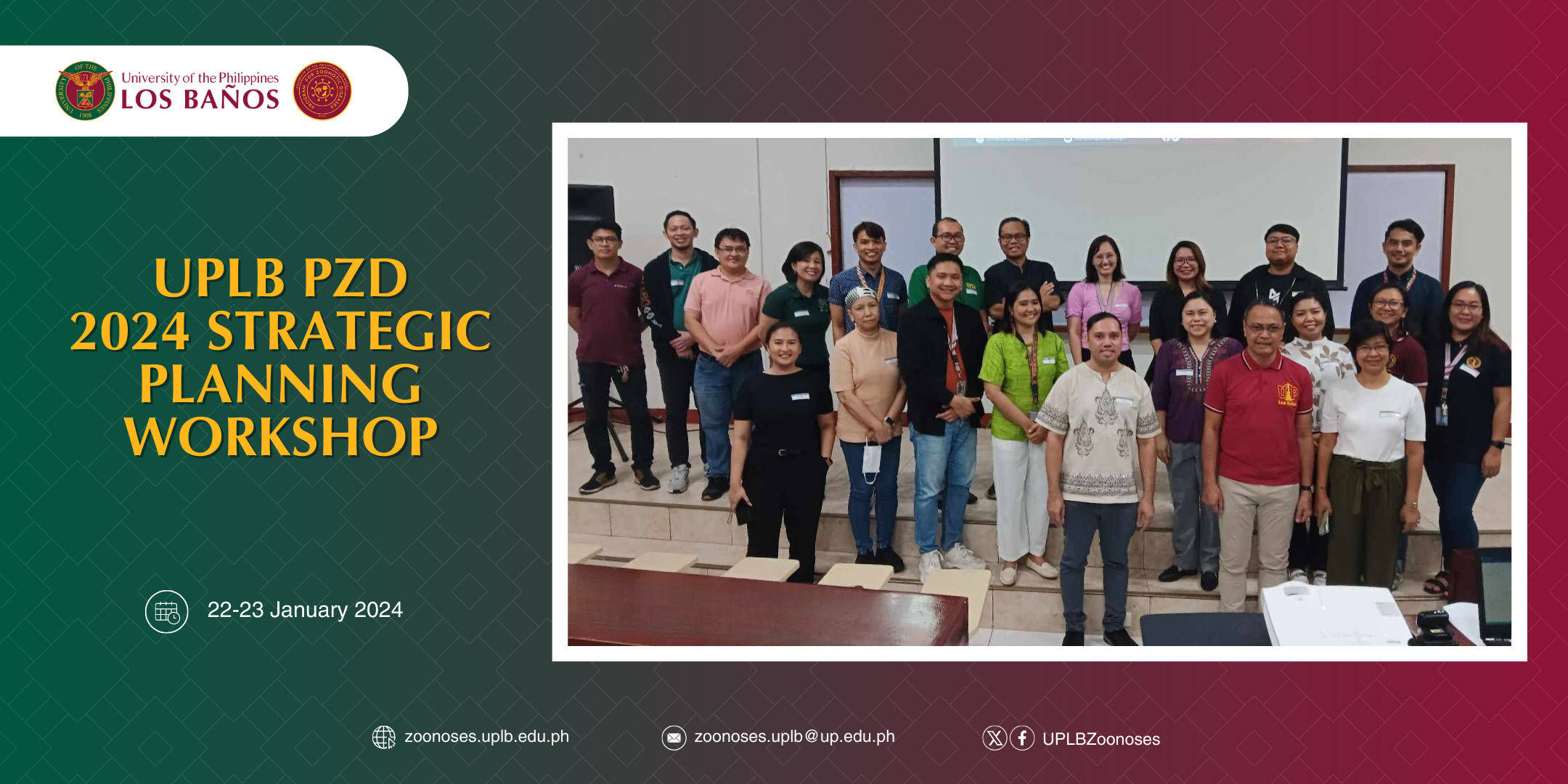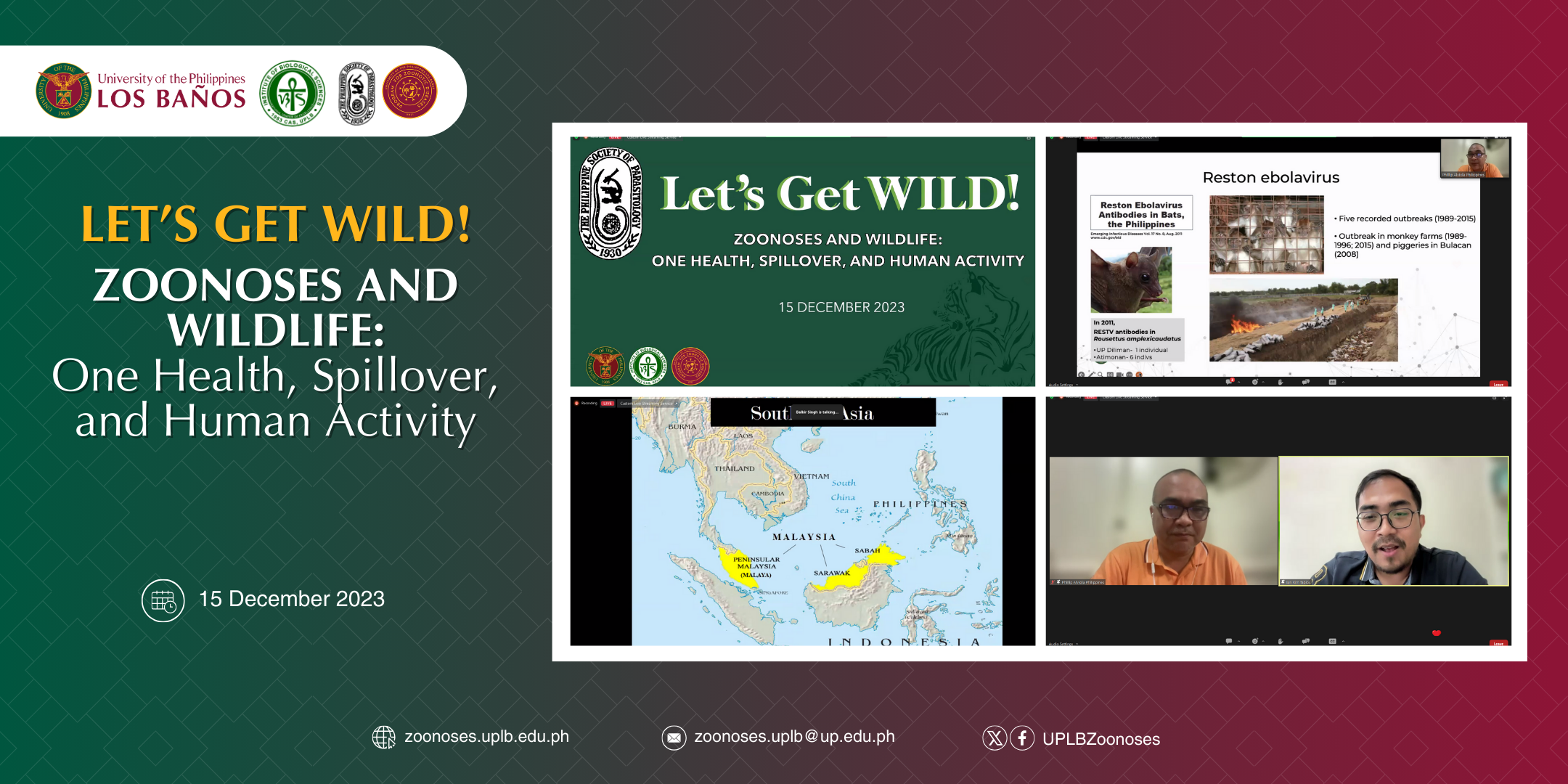UPLB PZD WITH UPLB IBS AND PSP CONDUCTS QPARAS TRAINING
“Creating space for spatial dimensions of One Health and Parasitology”
The UPLB Program for Zoonotic Diseases (PZD), in partnership with the UPLB Institute of Biological Sciences (IBS) and the Philippine Society of Parasitology, Inc. (PSP) conducted a four-day short-term course titled “Quantitative and Spatial Parasitology: Spatial Dimensions and its Application in One Health Parasitology” last 14–17 August 2023. Also called QPARAS Training, this course helped equip professionals, researchers, and students with the necessary knowledge and skills on spatial dimensions of parasitology and its application to ecology.
Participants, together with the training staff, pose for a photo on the second day of the training.
Eighteen participants, who were screened during the application period, immersed in the intensive activities and practical exercises of the course. Participants were faculty members, researchers, veterinarians, medical technologists, and undergraduate and graduate students from Luzon, Visayas, and Mindanao.
Capitalizing on the importance of collaboration, communication, and coordination, Prof. Vachel Gay Paller of the UPLB IBS started the QPARAS Training with a lecture on One Health and Parasitology. During her presentation, she delved into the realm of neglected tropical diseases (NTDs) caused by parasites and those with zoonotic potential, highlighting the continuing neglect particularly in the Philippines. She emphasized the critical significance of adopting the One Health approach to effectively control and eventually eliminate parasitic infections as a public health problem.
Prof. Vachel Gay Paller discussed One Health and Parasitology to start the QPARAS Training.
Building on the growing misidentification of parasites especially in the environment, Ms. Kennesa Klariz Llanes of UPLB IBS discussed the identification of parasites in an environmental matrix. She emphasized the presence of several artifacts in the environment and gave some tips and tricks on how to differentiate parasites from artifacts.
Ms. Kennesa Klariz Llanes discussed the identification of parasites in an environmental matrix.
On the second day, Asst. Prof. Sheina Macy Manalo of the UPLB Department of Veterinary Paraclinical Sciences shared to the participants the importance of spatial dimensions of parasites and mapping through the Geographical Information System (GIS). She shared the different applications of GIS in One Health and parasitology and in achieving the goal of controlling and eliminating parasitic infections. After the lecture, a guided mapping exercise using Quantum GIS (QGIS) was conducted. Participants were tasked to generate their own maps and discuss the insights they gained from their maps.
Asst. Prof. Sheina Macy Manalo discussed the Quantum GIS and its application in One Health and parasitology research.
Asst. Prof Manalo assists participants during the hands-on mapping activity using QGIS.
On the third day, Mr. Allen Jethro Alonte of UPLB IBS discussed the different socio-economic factors involved in parasitology as well as the statistical analyses commonly used in parasitology research. He introduced the use of R, a free software, for data analysis and visualization in parasitology research. During the laboratory exercise, participants were given a set of data to analyze and visualize using the software.
Mr. Allen Jethro Alonte discussed basic statistics and socio-economic analysis for parasite epidemiology research.
Laboratory prefectors assisted during the hands-on exercise on R and RStudio.
On the last day of the short-term course, Mr. Raffy Jay Fornillos from the UP Diliman Institute of Biology presented a special lecture on the growing interest and applications of environmental DNA (eDNA) in parasitology surveillance. He stated that through the use of eDNA, “we can directly connect human, animal, and environmental health and together weave a complete One Health story.”
Mr. Raffy Jay Fornillos presented a special lecture on the application of environmental DNA (eDNA) in parasitology surveillance.
In the culmination of the training, the knowledge and skills gained by the participants were assessed through the presentation of all of their outputs. The participants showed a grasp of the One Health approach in the context of parasitology. After the presentation, participants had a mini-campus tour of the beauty and diversity of the UPLB campus.
Participants present their outputs during the last day of the training.
Ending the course, Prof. Paller delivered her closing remarks and called on the participants as future collaborators and advocates of One Health. “We cannot do this alone. We hope that through this course we have multiplied ourselves and you, as faculty members, researchers, veterinarians, medical technologists, and students, will be the advocates for One Health in your own special way”
Prof. Paller emphasized the need to collaborate to go further rather than going alone.
The short-term QPARAS course is a part of the One Health and Parasitology training series spearheaded by Dr. Vachel Gay V. Paller. She is joined by Mr. Allen Jethro I. Alonte (assistant training coordinator), Parasitology Research Laboratory Team, Ms. Angelou Marie O. Aquino, Ms. Jasmin Renette D. Jimenez, Ms. Kennesa Klariz R. Llanes, Asst. Prof Sheina Macy Manalo, and Mr. Kim Louisse A. Patagnan. Dr. Paller, Mr. Alonte, and Mr. Raffy Fornillos are also officers of the Philippine Society of Parasitology, Inc.




